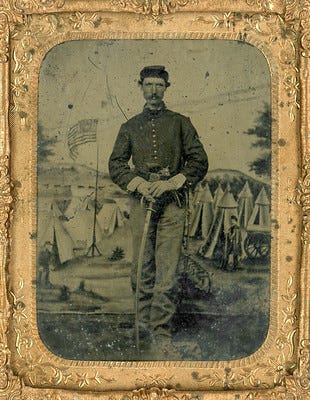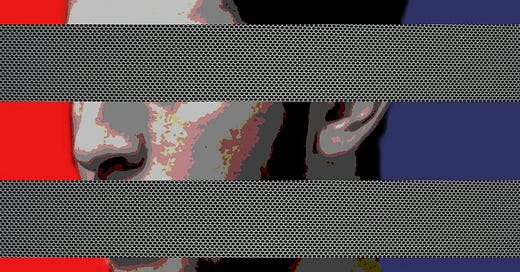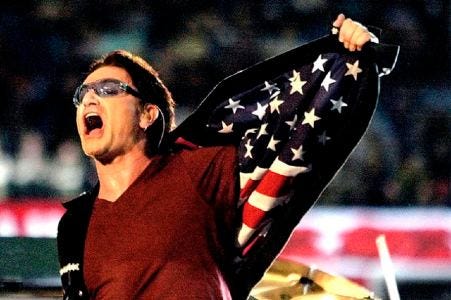20 Years After 9/11, One Thing to Remember is the Wave of Censorship That it Sparked
There are lessons for today
Young people tend to be more woke than older people. I’ve written about the age component of wokeness before; my theory is that it’s hard to have the blinding moral certainty wokeness requires once you’ve spent a decade or two stepping on your own balls. In comedy, the woke/non-woke split seems to be especially age-dependent. And I think there’s a reason for that: If you’re old enough to have worked in the 2000s, then you remember the wave of right-wing censorship that followed 9/11.
Try to mentally travel back to the early 2000s. Really put yourself there — start by recalling that you’re wearing low-rise, wide-legged jeans that have a washed-out strip on the front of each leg for some goddamned reason. It’s possible that just the ends of your hair are dyed blonde, and — though you may have repressed this memory — you might be wearing a puka shell necklace. R. Kelly is huge. You only recently stopped saying “is that your final answer?” You just spent $300 on a .6 megapixel camera, which you justified by saying: “I’ll use it for a long time” (you galactic moron). You get your movies via DVD in the fucking mail, which just 20 years later seems like how soldiers would have gotten movies during the Civil War.

Another thing you might recall is that the right was culturally dominant back then. This was true even before 9/11. In the ‘90s, Murphy Brown was criticized for being a single mom, NBC faced backlash when Sinead O’Connor tore up a picture of the Pope on SNL, and Ellen DeGeneres coming out as gay basically ended her show. Part of George W. Bush’s campaign pitch was “restoring dignity to the Oval Office,” which was a polite way of saying “I promise not to ejaculate on my employees.” Liberals were constantly playing defense; this Bill Clinton ad from the ‘90s backs 11PM curfews for children (really, curfews?), “school uniforms to instill discipline”, and requiring teenage mothers to “stay in school or lose welfare”. It does everything short of calling for a national “stop slouching!” policy and backing the death penalty for sass-mouth.
This was the environment in which 9/11 happened. 9/11 was like the murder of George Floyd in that it was a visceral event; people were angry. Also, it was on video, you saw it happen, which enhanced the sense of being there and activated the most primal parts of our brains. As was often the case back then, The Onion captured the zeitgeist best, running a debate column titled: “We Must Retaliate With Blind Rage vs. We Must Retaliate With Measured, Focused Rage”.
Many aspects of the post-9/11 atmosphere mirrored the atmosphere following George Floyd’s death. Remember how last summer, companies did a lot of show off-y political stuff that made you think “yeah, okay, obviously I broadly agree but you’re clearly just trying to sell me stuff”? There was a lot of that in 2001. The first Super Bowl after 9/11 was a contest to see which company could cram the most flags and firefighters into a 60-second spot. The zenith of that genre was a well-received Budweiser ad in which the Clydesdales kneel before a diminished New York City skyline. Watch it — it’s a tear jerker. You almost forget that horses are beasts lacking capacity for abstract thought.
Then, like now, celebrities, athletes, and sports leagues made political statements. 2001 is when they started singing “God Bless America” at baseball games. The Yankees and Mets wore hats honoring the NYPD and fire department. Songs about 9/11 came from Toby Keith, Tory Amos, and Coldplay, the holy trinity of musicians about whose opinions I don’t give a rat’s ass. As he so often does, Bono explored the boundary between admirable humanitarian and colossal wanker by performing a Super Bowl half time show that was so uplifting-yet-self-promoting that it made you want to give Bono a big hug and then shove him down a flight of stairs.
I consider all of these things to be neutral-to-good. When a tragedy affects people emotionally, expressions of solidary can give comfort. They can also, it just so happens, sell a lot of Budweiser — I wonder if Anheuser-Busch knew that when they made that ad! So, yes, there’s a self-serving element to some of these displays, and my ancestors fought wars so that I could roll my eyes and shit-post about that, but they’re mostly-innocuous and sometimes kind-of-nice. So, I’m generally on board.
But the post-9/11 atmosphere wasn’t all performatively-reverent horses and Irishmen. There was a chilling effect that permeated political speech and art. In a precursor to the hysteria we saw last summer, Hollywood rushed to change anything that might be seen as insensitive. Some of those changes made sense: Yeah, sure, change Lilo & Stitch so that they don’t fly a 747 through a city-scape — you can’t have people thinking that Stitch might harbor Al Qaeda sympathies. But other changes were pretty dumb. TV versions of Meet the Parents heavily edited the (very funny) airport scene to remove the word “bomb”. Some airings of Back to the Future omitted the entire “Doc Brown is killed by terrorists” storyline, which is like Star Wars omitting the “space” storyline. Meanwhile, there was a surge in simplistic “get the bad guys” narratives (e.g. 24) and boring pablum: One of the first movies released after 9/11 was The Majestic, a cornball piece of shit that Salon film critic (and Liberian Dictator?) Charles Taylor called “one of those movies that makes you feel as though the national IQ is dropping while you’re watching it.”
People who took risks got cancelled. The most notorious incident involved Bill Maher, whose Politically Incorrect show was literally cancelled after he said that the 9/11 hijackers weren’t cowards. A little while later, the Dixie Chicks’ career took a major hit when they criticized President Bush. In both cases, those cancellations can be waved away using the same logic that the “cancel culture doesn’t exist” crowd uses today: They just suffered consequences, their careers didn’t end. Which is true, but it ignores whether the consequences they suffered were fair, and also ignores all the people who saw what happened and thought “whoa — better watch it.”
This was the atmosphere when I started doing comedy in the mid-2000s. It was hard to know exactly what the rules were — there were lines you couldn’t cross involving the police and perceived anti-Americanism, but the lines weren’t clear. The fact that nobody knew the rules heightened the fear, and the smart thing to do was to play it ultra-safe. As it happens, this atmosphere is captured in a mid-2000s TV classic: Studio 60 on the Sunset Strip. Studio 60 is legendary among comedy writers; it was Aaron Sorkin’s West Wing follow-up, it ran for one season, and it is hilariously terrible. It’s about an SNL-type show that undergoes a renaissance, and comedy writers love it because the sketches that are supposed to be part of this brilliant comedic revival are God-fucking-awful.1 It’s an instant classic; this clip of the show’s writers reacting to a lame idea about a Gilbert & Sullivan parody as if they’d discovered dark energy is one of the unintentionally-funniest things ever broadcast.
BUT, crucially for this conversation, the show captured a major dynamic in television at the time: fear of right-wing backlash. Most episodes involved the ostensible geniuses running the show writing another edgy, gut-busting sketch (like “Science Schmience”) only to have the network suits tell them: “You can’t do that — conservatives will freak out!” Trite, yes, but reflective of a real thing: Shows back then lived in fear of calls from outraged conservatives. If someone swore on an awards show or exposed 82 percent of their boob at the Super Bowl, the network had a problem. The atmosphere was far more prudish than today, when the nation mostly cheers when J-Lo and Shakira team up for a halftime show that’s basically the Super Bowl of Remarkable Asses.
The climate was stifling and unhealthy. The worst consequences of that climate came in the political arena, where debate surrounding issues like surveillance and war were warped by a pervasive fear of saying the wrong thing (see again: Bill Maher). Ironically, given the parallels with the atmosphere after George Floyd’s death, one of the areas where debate was shut down was police conduct. Prior to 9/11, the NYPD was facing heavy criticism due to the abuse of Abner Louima and the shooting of Amadou Diallo. But when 71 New York police officers died on 9/11, that dialogue stopped. You simply couldn’t say anything that seemed critical of the NYPD, even though there were parts of the NYPD that deserved criticism.
One of the reasons I’m bothered by today’s censorious atmosphere is that I feel like this is the second time I’ve been through this. It’s a lot less fun this time, because it’s “my side” that’s doing it. Last time, I was Johnny Rotten giving the establishment the finger; this time I’m the dad on an ‘80s sitcom saying “Hey, Champ — is that really the right thing to do?”
I’d describe what happened after 9/11 as a collective shutting off of brains. When it came to anything 9/11-related, it was too difficult to do anything other than express your combined sympathy and anger (which we were all feeling), so tough conversations were avoided. That allowed the Patriot Act to fly through Congress with overwhelming majorities, even though people almost immediately began to see it as overreach. There wasn’t enough discussion about our precise goals in Afghanistan, and we probably paid dearly for that. The thinking and talking we should have been doing were replaced by posturing, virtue signaling, and the goddamned Majestic.
Not many people these days argue that the panicked atmosphere that followed 9/11 served us well. With 20 years of hindsight, the impassioned, absolutist reactions have aged poorly, while analytical approaches have gained support. In the 2004 campaign, John Kerry was roundly mocked for this comment:
''We have to get back to the place we were, where terrorists are not the focus of our lives, but they're a nuisance.
As a former law enforcement person, I know we're never going to end prostitution. We're never going to end illegal gambling. But we're going to reduce it, organized crime, to a level where it isn't on the rise. It isn't threatening people's lives every day, and fundamentally, it's something that you continue to fight, but it's not threatening the fabric of your life.''
This is the prevailing view today. Terrorism is a problem; we’re going to take it seriously and fight it, but that’s as far as it goes. We’re not going to think about it 24 hours a day. We’re not going to debase our principles pursuing it. And we’re not going to fight endless wars in a futile attempt to stamp it out.
It took us 20 years to come around to that position. If we had been less vehement and more analytical, we might have gotten there sooner. I think approaches to racism and police misconduct are similar: The best solutions are likely to come from scrutiny and reason. But for that to happen, we need to be free to think and talk about the problem without fear. Neutered art is often the canary in the coal mine indicating an unhealthy atmosphere for speech, so it’s troubling when things happen like Comedy Central removing the classic “Diversity Day” episode of The Office. That strikes me as a very editing-the-Doc-Brown-terrorism-storyline-out-of-Back-to-the-Future-type move. For me, “never forgetting” 9/11 includes never forgetting the mistakes we made in the aftermath that we should try hard to not repeat.
***Poll for Tuesday***
I'd like the next column to be about...
1. How Covid is becoming a culture war issue [VOTE FOR THIS]
2. The Reconciliation bill that Congress is hammering out -- we know more about it now, break it down a bit [VOTE FOR THIS]
3. How the progressive narrative about gentrification is extremely anti-progressive [VOTE FOR THIS]
I’m very hard on Studio 60 here, so let me also add: I really like Aaron Sorkin. I think he’s done some outstanding stuff. Unfortunately, in my opinion, Studio 60 wasn’t one of his good ones.






How the hell did I miss Studio 60?!? Wow!
Great piece. Doing back-track through your posts, this is one of your best.
My favorite post so far. An important point + hilarious (Studio 60 omg)